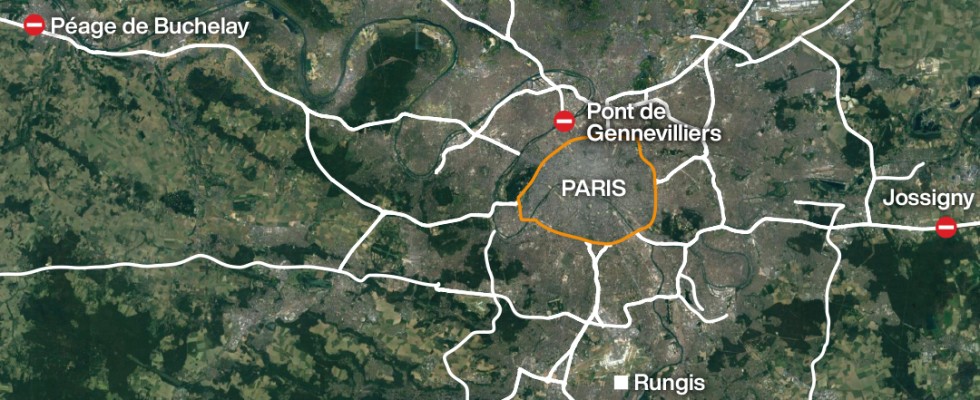New day of action for farmers this Monday, January 29, 2029. Blockages on several highways leading to Paris have begun. The objective: to try to block Rungis, a symbolic place because its international market supplies Paris and the entire Île-de-France region. The bosses of the FNSEA and Young Farmers will be received by Prime Minister Gabriel Attal around 6 p.m.
4 mins
In France, angry farmers began blocking the main routes into Paris. They plan to install 8 roadblocks around the capital in order to make it a siege to maintain pressure on the government and obtain new measures.
The siege of Paris in progress
At 2 p.m., at the Buchelay toll station in Yvelines northwest of Paris, the A13 motorway was blocked in the province-Paris direction. The farmers say they are ready to stay several days if their demands are not met.
On the other side of the capital, in Jossigny (Seine-et-Marne), tractors were positioned in both directions of traffic to block the A4. In less than two hours, farmers transformed this portion of the highway into a small village. Generators, site toilets and braziers have been installed to allow you to spend at least three days on site. In the livestock trailer, straw is provided for sleeping comfortably. The farmers are patient and well organized too. They will take turns to last as many days as possible: “ I’m associated with another farmer, I work 12 hours today, it’s 12 hours at night », explains one of them.
Everyone here says it: they are ready to stay a week, and even more if necessary…
Report by Nathanaël Vittrant at the farmers’ barrier on the A4 motorway, the axis which connects Reims to the capital
In total, eight “blocking points” on major highways a few kilometers or tens of kilometers from the Paris ring road are planned by the FNSEA and the Young Farmers (JA).
Thirty departments are affected, according to the gendarmerie and 16 highways are affected by this mobilization which affects all of France.
Read alsoAnger of farmers in France: “direct and local sales protect us from unfair competition”
Block Rungis
A convoy of tractors left the southwest of France to block the Rungis market, in the Paris suburbs. He is expected on site Tuesday January 30 evening or Wednesday morning. Rungis is the first fresh produce market in the world, where a large majority of butchers, fishmongers, greengrocers and restaurateurs in Île-de-France get their supplies.
To avoid this blockage, as well as that of Orly and Roissy airports, the deployment of 15,000 police officers and gendarmes was announced throughout the territory.
Also listen:Anger of farmers: “Their income is very uncertain and subject to uncertainties”
What is the Rungis market?
Located south of Paris, the Rungis international market is structured into specialized pavilions intended to provide fresh products to professionals in Paris, but also to the entire Île-de-France region. Proof of its importance, it is also the largest market for agricultural products in the world, an essential place for a large part of the country.
Rungis in figures is:
- 234 hectares of surface area, the equivalent of a city within a city
- 3 million tonnes of goods pass through it per year, more than half of which are food products
- an annual turnover of 10 billion euros
If the farmers want to join Rungis to demonstrate, it is quite simply because it is the central market of the capital, its suburbs, neighboring departments and Europe. Concretely, almost everything you find on the stalls of greengrocers, butchers, fishmongers or even on the menu of restaurants in the Paris region, goes through Rungis. And to do this, the goods arrive every day in hundreds of chartered trucks to the hangars, but also by trains or by plane. Well-established mechanics and logistics that feed 18 million inhabitants, a little less than one in 3 French people.
A place inaugurated in 1969, which has become a real institution, and which replaced the old Halles in the center of Paris.
At the same time, snail operations organized by taxis, which are demanding from Health Insurance a renegotiation of the conditions of remuneration for patient transport, are blocking several routes in Paris, Marseille and Bordeaux.
Emmanuel Macron is due to hold a meeting at the Élysée around 3 p.m. this Monday, January 29 in the presence of Prime Minister Gabriel Attal, Minister of Agriculture Marc Fesneau (Agriculture), Minister of the Economy Bruno Le Maire, Christophe Béchu, Minister of Ecology and Gérald Darmanin. The Council of Ministers is exceptionally scheduled for 4 p.m. since the president must fly to Sweden at the end of the afternoon for a state visit on Tuesday and Wednesday, before an extraordinary European Council in Brussels.
The bosses of the majority French agricultural unions, FNSEA and JA (Young Farmers), have a meeting at 6 p.m. with the Prime Minister. The president of the FNSEA, Arnaud Rousseau, ensures that no region of France will be spared from road blockages, and that a system of rotations “ to allow demonstrators to rest » is planned pending further announcements.
Gabriel Attal, who will make his general policy declaration on Tuesday January 30, has already unveiled emergency measures on Friday January 26, including the abandonment of the increase in the tax on non-road diesel (GNR), inflated compensation for breeders whose cattle were affected by epizootic hemorrhagic disease, heavy sanctions against three agri-food manufacturers (unnamed) not respecting the Egalim laws on prices. But these announcements are insufficient by the unions.
Read alsoThe FNSEA and JA farmers’ unions in the Paris basin announce “a siege of the capital” from Monday
